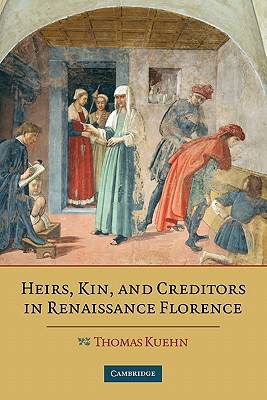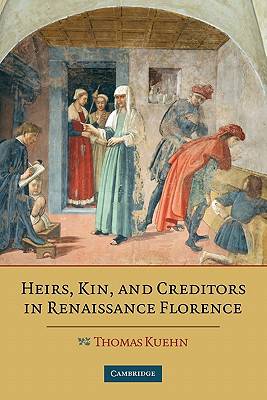
Bedankt voor het vertrouwen het afgelopen jaar! Om jou te bedanken bieden we GRATIS verzending (in België) aan op alles gedurende de hele maand januari.
- Afhalen na 1 uur in een winkel met voorraad
- In januari gratis thuislevering in België
- Ruim aanbod met 7 miljoen producten
Bedankt voor het vertrouwen het afgelopen jaar! Om jou te bedanken bieden we GRATIS verzending (in België) aan op alles gedurende de hele maand januari.
- Afhalen na 1 uur in een winkel met voorraad
- In januari gratis thuislevering in België
- Ruim aanbod met 7 miljoen producten
Zoeken
€ 72,45
+ 144 punten
Uitvoering
Omschrijving
Visions of modernity rest in part on a distinction between inherited status (past) and achievement (present). Inheritance is taken as automatic, if not axiomatic; the recipients are passive, if grateful. This study, based on a singular source (Florentine repudiations of inheritance), reveals that inheritance was in fact a process, that heirs had options: at the least, to reject a burdensome patrimony, but also to maneuver property to others and to avoid (at times deceptively, if not fraudulently) the claims of others to portions of the estate. Repudiation was a vestige of Roman law that became once again a viable legal institution with the revival of Roman law in the Middle Ages. Florentines incorporated repudiation into their strategies of adjustment after death, showing that they were not merely passive recipients of what came their way. These strategies fostered family goals, including continuity across the generations.
Specificaties
Betrokkenen
- Auteur(s):
- Uitgeverij:
Inhoud
- Aantal bladzijden:
- 256
- Taal:
- Engels
Eigenschappen
- Productcode (EAN):
- 9780521178471
- Verschijningsdatum:
- 3/03/2011
- Uitvoering:
- Paperback
- Formaat:
- Trade paperback (VS)
- Afmetingen:
- 152 mm x 229 mm
- Gewicht:
- 381 g

Alleen bij Standaard Boekhandel
+ 144 punten op je klantenkaart van Standaard Boekhandel
Beoordelingen
We publiceren alleen reviews die voldoen aan de voorwaarden voor reviews. Bekijk onze voorwaarden voor reviews.









